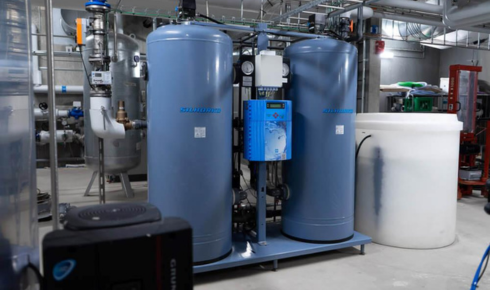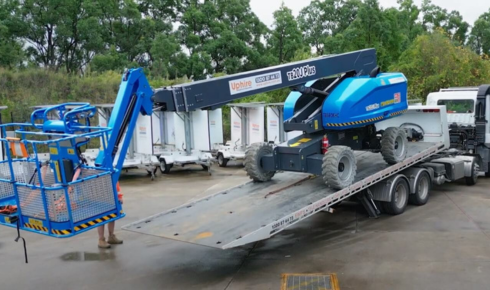Explore Uphire’s robust heavy-duty line-up of industrial and rough-terrain forklifts in this article. Discover the features and capabilities of these versatile machines designed to handle the toughest jobs in various work environments. Gain insights into how Uphire’s forklifts can enhance productivity and efficiency in industrial operations.
Uphire offers an extensive range of forklifts tailored to meet diverse operational needs. Visit Uphire to explore advanced features that ensure optimal performance even in challenging conditions. These forklifts are crafted to boost productivity effectively while maintaining safety and reliability across various sectors, making them invaluable in industrial settings.
Overview of Industrial Forklifts
Industrial forklifts are essential equipment in various industrial settings, including warehouses, distribution centers, manufacturing facilities, and construction sites. These powerful machines are designed to lift and move heavy materials and goods efficiently and safely. Industrial forklifts come in different types and sizes, each suited for specific tasks and environments. Common types of industrial forklifts include counterbalance forklifts, reach trucks, pallet jacks, and rough terrain forklifts. These machines are equipped with a hydraulic lifting mechanism and forks that can be raised and lowered to lift and transport loads. Industrial forklifts are highly versatile and can handle a wide range of materials, from pallets and containers to machinery and equipment.
Safety is paramount when operating industrial forklifts, as they can pose significant risks to operators and bystanders if not used correctly. Proper training and certification are required for anyone operating a forklift to ensure they understand the equipment’s capabilities and limitations, as well as safe operating practices. Regular maintenance and inspections are also crucial to keep industrial forklifts in optimal working condition and prevent accidents or breakdowns. By following proper safety protocols and maintenance procedures, industrial forklifts can help improve efficiency and productivity in industrial operations while ensuring the well-being of workers and the protection of goods and materials.
Types of Rough-Terrain Forklifts
Rough-terrain forklifts are designed to operate in challenging outdoor environments, making them ideal for construction sites, lumber yards, and other rough terrains. There are several types of rough-terrain forklifts, each with its own unique features and capabilities. One common type is the straight-mast forklift, which is characterized by its vertical mast that extends upward and can lift loads to significant heights. These forklifts are versatile and can handle a variety of loads, making them a popular choice for outdoor applications.
Another type of rough-terrain forklift is the telescopic handler, also known as a telehandler. These forklifts feature a telescoping boom that can extend both forward and upward, providing increased reach and versatility. Telehandlers are highly maneuverable and can perform a wide range of tasks, from lifting and moving heavy materials to reaching over obstacles. Their ability to extend and retract the boom makes them well-suited for applications where precise positioning of the load is required. Overall, rough-terrain forklifts come in various types to suit different needs and provide efficient material handling solutions in challenging outdoor environments.
Uphire Telehandlers provide a wide selection of telescopic handlers to meet diverse industrial needs. These versatile machines are ideal for construction sites, agricultural tasks, and event setups. With their advanced features, they ensure safe and efficient operation on rugged terrains, allowing operators to perform tasks with precision and ease.
Features and Benefits of Uphire’s Heavy-Duty Forklifts
Uphire’s heavy-duty forklifts are designed with a range of features that ensure optimal performance and efficiency in handling heavy loads. These forklifts are equipped with robust and durable construction, capable of withstanding the most demanding industrial environments. The heavy-duty forklifts from Uphire come with a high lifting capacity, allowing them to handle heavy loads with ease. They also feature advanced hydraulic systems that provide smooth and precise lifting and lowering operations, enhancing productivity and safety in the workplace. Additionally, these forklifts are equipped with ergonomic operator cabins that prioritize comfort and visibility, reducing operator fatigue and improving overall efficiency during long shifts. With their reliable performance and sturdy construction, Uphire’s heavy-duty forklifts are ideal for a wide range of industrial applications, from construction sites to warehouses.
One of the key benefits of Uphire’s heavy-duty forklifts is their versatility and adaptability to diverse working conditions. These forklifts are designed to navigate rough terrain and uneven surfaces with ease, making them suitable for outdoor as well as indoor applications. The heavy-duty forklifts from Uphire offer excellent maneuverability and control, allowing operators to work efficiently in tight spaces and crowded environments. Moreover, these forklifts are equipped with advanced safety features such as stability control systems and anti-tip mechanisms, ensuring a secure working environment for both the operators and the loads being handled. With their high performance, durability, and safety features, Uphire’s heavy-duty forklifts provide a reliable solution for businesses looking to enhance their material handling capabilities and maximize productivity.
Applications of Industrial Forklifts in Various Industries
Industrial forklifts play a crucial role in various industries by facilitating the movement of heavy materials and equipment efficiently and safely. In the manufacturing industry, forklifts are used to transport raw materials, components, and finished products within factories, warehouses, and distribution centers. They help streamline production processes by enabling quick and easy loading and unloading of materials, which ultimately boosts productivity and reduces manual labor. Additionally, forklifts are essential in the construction industry for lifting and moving heavy construction materials such as steel beams, concrete blocks, and lumber. They enable construction workers to transport materials across construction sites with ease, enhancing efficiency and speeding up project timelines.
In the logistics and transportation sector, industrial forklifts are indispensable for loading and unloading goods from trucks, containers, and railcars. They are used in warehouses and distribution centers to handle palletized goods, stack them in racks, and retrieve them for order fulfillment. Forklifts help optimize storage space by allowing goods to be stored vertically, maximizing warehouse capacity. Moreover, in the agricultural industry, forklifts are utilized for various tasks such as handling bulk feed, transporting harvested crops, and loading agricultural produce onto trucks for distribution. Their versatility and adaptability make them valuable assets across a wide range of industries, contributing to improved operational efficiency and cost-effectiveness.
Safety Considerations for Operating Heavy-Duty Forklifts
Safety considerations for operating heavy-duty forklifts are crucial to prevent accidents and injuries in the workplace. One important aspect of safety is ensuring that operators are properly trained and certified to operate the forklifts. Training should cover not only the technical aspects of operating the equipment but also safety protocols, such as how to properly load and unload materials, how to navigate various terrain and obstacles, and how to communicate effectively with other workers in the area. Regular refresher training sessions should be conducted to ensure that operators stay up to date with the latest safety practices and regulations.
Another key safety consideration is conducting pre-operation inspections of the forklifts to identify any potential hazards or issues that could affect the safe operation of the equipment. Operators should check for any leaks, damage, or malfunctions in the forklift’s components, such as brakes, steering, tires, and lights. It is also important to ensure that the forklift is properly maintained according to the manufacturer’s guidelines, including regular servicing and inspections. By taking these safety considerations seriously, employers can create a safer work environment for their employees and reduce the risk of accidents involving heavy-duty forklifts.
Maintenance Tips for Ensuring Forklift Longevity
Regular maintenance is crucial to ensuring the longevity of forklifts. To begin with, it is important to adhere to the manufacturer’s recommended maintenance schedule. This includes regular inspections, oil changes, filter replacements, and other routine tasks to keep the forklift running smoothly. Checking for any signs of wear and tear on components such as tires, brakes, and hydraulic systems is also essential to catch any issues early on and prevent them from causing more extensive damage. Additionally, maintaining proper fluid levels, such as oil, hydraulic fluid, and coolant, is vital for the optimal functioning of the forklift and to prevent overheating or other mechanical issues.
Furthermore, proper training and education for forklift operators on how to use the equipment correctly can also contribute to the longevity of the forklift. Operators should be trained on how to operate the forklift safely, avoid overloading it, and handle it with care to prevent unnecessary wear and tear. Encouraging operators to report any issues or abnormalities they notice during operation can help address potential problems promptly. Lastly, storing the forklift in a clean and dry environment when not in use can also help prevent corrosion and damage from environmental factors, further extending the lifespan of the equipment.
Comparison of Electric vs. Diesel Forklifts
Electric forklifts and diesel forklifts are two popular options in the material handling industry, each with its own set of advantages and disadvantages. Electric forklifts are known for their eco-friendliness, as they produce zero emissions during operation. This makes them ideal for indoor use, as they do not emit harmful fumes or gases. Additionally, electric forklifts are quieter than diesel forklifts, creating a more conducive work environment. They also have lower maintenance costs, as they have fewer moving parts compared to diesel forklifts. However, electric forklifts typically have a higher upfront cost and may require longer charging times, which can impact productivity if not managed effectively.
On the other hand, diesel forklifts are favored for their higher power and performance capabilities, making them ideal for heavy-duty outdoor applications. Diesel forklifts have faster refueling times compared to electric forklifts, which can be a significant advantage in industries where downtime needs to be minimized. They also have a longer lifespan and can operate for longer hours on a single tank of fuel, making them more suitable for continuous and intensive use. However, diesel forklifts produce emissions that can be harmful to the environment and are typically noisier than electric forklifts, which may not be suitable for indoor use or noise-sensitive environments.
Upcoming Trends in Rough-Terrain Forklift Technology
Upcoming trends in rough-terrain forklift technology are poised to revolutionize the way materials are handled in challenging environments. One key trend is the integration of advanced digital technology, such as telematics and IoT sensors, to enhance the efficiency and safety of rough-terrain forklift operations. These technologies enable real-time monitoring of the forklift’s performance, maintenance needs, and operator behavior, allowing for proactive maintenance and improved decision-making. Additionally, the use of data analytics can provide valuable insights into optimizing routes, load capacities, and energy consumption, leading to more cost-effective and sustainable operations.
Another significant trend in rough-terrain forklift technology is the development of electric and hybrid models to reduce emissions and operating costs while maintaining performance in rugged terrains. Electric forklifts are becoming increasingly popular due to their lower environmental impact and quieter operation, making them ideal for indoor and urban construction sites where noise and air pollution are concerns. Hybrid forklifts combine the benefits of electric power with the extended range and power of traditional diesel engines, offering a versatile solution for operations that require both indoor and outdoor capabilities. As battery technology continues to advance, we can expect to see even more efficient and powerful electric forklifts entering the market, further driving the shift towards sustainable and eco-friendly material handling solutions.
Case Studies: Successful Implementation of Uphire’s Forklifts
One successful case study of Uphire’s forklifts implementation is at a large warehouse facility. The company was facing challenges with efficiently moving and organizing heavy inventory within the warehouse. Uphire provided a fleet of electric forklifts that were tailored to the specific needs of the facility. The implementation of Uphire’s forklifts not only improved operational efficiency but also increased safety standards within the warehouse. The forklifts’ advanced features such as ergonomic design, precise controls, and safety sensors significantly reduced the risk of accidents and injuries among the warehouse staff. The company reported a notable increase in productivity and a decrease in operational costs after implementing Uphire’s forklifts, making it a successful case study of how the right equipment can transform a business’s operations.
Another successful case study of Uphire’s forklifts implementation is in the construction industry. A construction company was struggling with manual labor-intensive processes for moving heavy materials across the construction site. Uphire provided a range of rough terrain forklifts that were capable of navigating challenging terrains and lifting heavy loads with ease. The implementation of Uphire’s forklifts streamlined the construction process, enabling faster completion of projects and reducing labor costs. The construction company saw a significant improvement in operational efficiency and project timelines after integrating Uphire’s forklifts into their operations. This case study highlights how utilizing the right equipment like Uphire’s forklifts can revolutionize processes in industries like construction, leading to improved outcomes and cost savings.
Choosing the Right Forklift for Your Business Needs
Choosing the right forklift for your business needs is crucial for maximizing efficiency and productivity in your operations. The first step in selecting the appropriate forklift is to assess your specific requirements, such as the type of materials you will be handling, the weight capacities needed, the height of the shelving or racking systems in your warehouse, and the layout of your workspace. For example, if you are working in a narrow aisle warehouse, a reach truck or a narrow aisle forklift might be the best option to maneuver through tight spaces. On the other hand, if you are handling heavy loads outdoors, a rough terrain forklift with sturdy tires and a powerful engine would be more suitable.
After identifying your business needs, it is essential to consider the different types of forklifts available on the market, such as electric forklifts, gas-powered forklifts, and diesel forklifts. Each type has its own advantages and limitations, so it is important to weigh factors like fuel efficiency, maintenance costs, environmental impact, and operational requirements. Additionally, factors like forklift capacity, lift height, and attachments like side-shifters or fork positioners should also be taken into account when choosing the right forklift for your business. By carefully evaluating your needs and comparing the features of different forklift models, you can make an informed decision that aligns with your business goals and budget.














